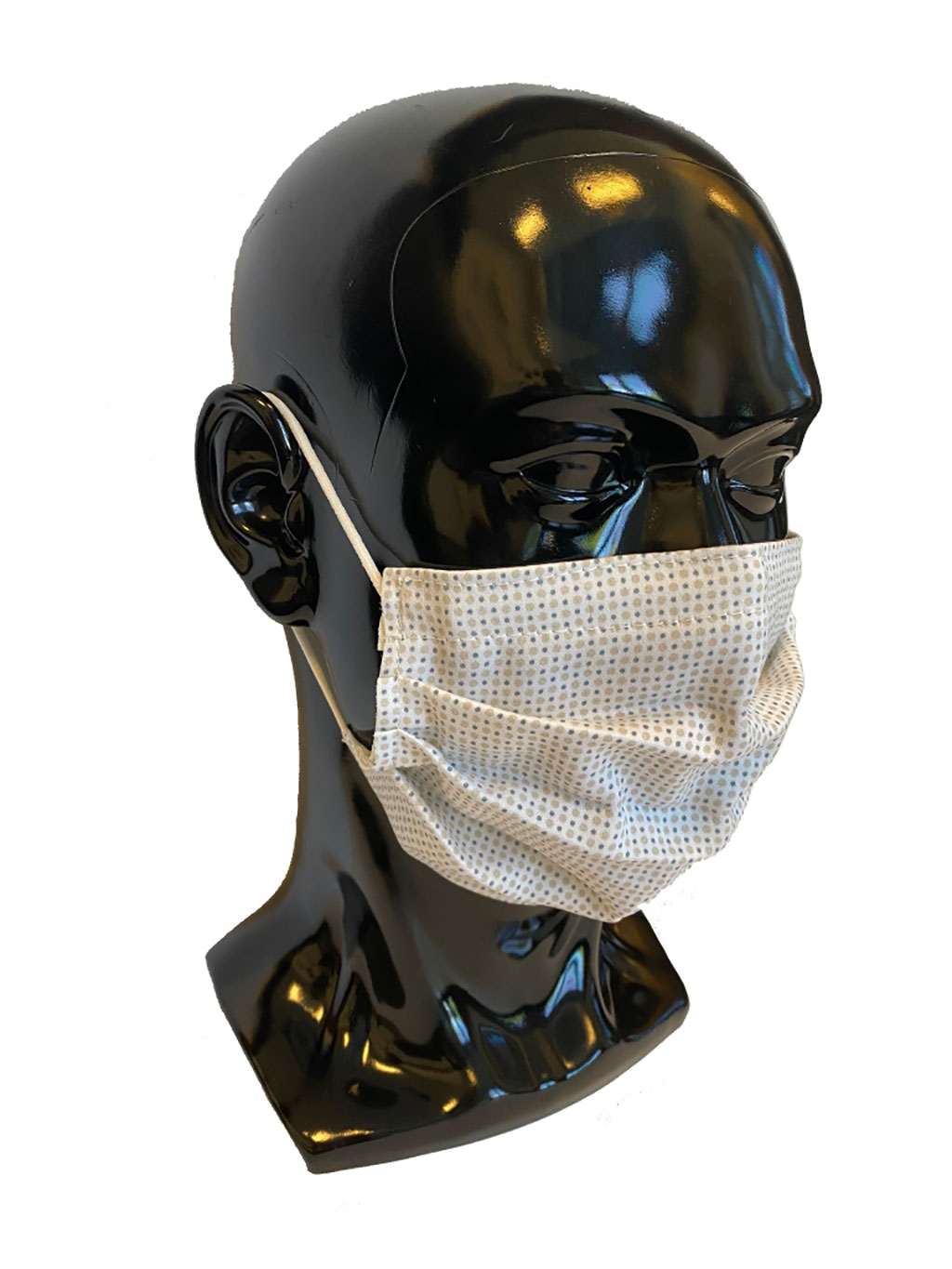Electric Anti-Viral Face Mask Eradicates Coronavirus Upon Contact
|
By HospiMedica International staff writers Posted on 26 Jun 2020 |

Image: Electric Anti-Viral Face Mask (Photo courtesy of Chandan Sen)
Researchers from the Indiana University (Bloomington, IN, USA) have demonstrated for the first time that coronaviruses are killed upon exposure to an electroceutical fabric.
"Electroceutical" refers to a matrix of embedded microcell batteries that creates an electric field and wirelessly generates a low level of electricity in the presence of moisture. Coronaviruses rely on electrostatic interactions to be able to attach to their host and assemble themselves into an infective form. Their structure must remain stable in order to spread infection. The electroceutical surface technology, called V.Dox Technology, is a proprietary dot-matrix pattern of embedded microcell batteries that create an electric field and wirelessly generate a low level of electricity when moist.
Their research results demonstrated that the ability of the virus to infect is fully eliminated within one minute of contact with the fabric, which disrupts the electrostatic forces the virus needs. The data shows that coronaviruses are killed by exposure to the low-level electric field-generating fabric, which is currently in use as a broad-spectrum antimicrobial wound care dressing. The electroceutical technology offers clinicians a non-antibiotic solution for infection risk reduction and potentially increases its value for use in face masks and possibly other surface treatments. The immediate goal with the data findings is to receive approval through the FDA's Emergency Use Authorization program to apply use of the fabric specifically for face masks in the fight against COVID-19.
"This work presents the first evidence demonstrating that the physical characteristic features of coronaviruses may be exploited to render them non-infective following contact with low-level electric field-generating electroceutical fabric," said Chandan Sen, principal author of the study and director of the Indiana Center for Regenerative Medicine and Engineering at the IU School of Medicine. "Our hope is that these findings will help Vomaris receive FDA Emergency Use Authorization and that we can utilize this fabric widely in the fight against COVID-19, ultimately saving lives."
Related Links:
Indiana University
"Electroceutical" refers to a matrix of embedded microcell batteries that creates an electric field and wirelessly generates a low level of electricity in the presence of moisture. Coronaviruses rely on electrostatic interactions to be able to attach to their host and assemble themselves into an infective form. Their structure must remain stable in order to spread infection. The electroceutical surface technology, called V.Dox Technology, is a proprietary dot-matrix pattern of embedded microcell batteries that create an electric field and wirelessly generate a low level of electricity when moist.
Their research results demonstrated that the ability of the virus to infect is fully eliminated within one minute of contact with the fabric, which disrupts the electrostatic forces the virus needs. The data shows that coronaviruses are killed by exposure to the low-level electric field-generating fabric, which is currently in use as a broad-spectrum antimicrobial wound care dressing. The electroceutical technology offers clinicians a non-antibiotic solution for infection risk reduction and potentially increases its value for use in face masks and possibly other surface treatments. The immediate goal with the data findings is to receive approval through the FDA's Emergency Use Authorization program to apply use of the fabric specifically for face masks in the fight against COVID-19.
"This work presents the first evidence demonstrating that the physical characteristic features of coronaviruses may be exploited to render them non-infective following contact with low-level electric field-generating electroceutical fabric," said Chandan Sen, principal author of the study and director of the Indiana Center for Regenerative Medicine and Engineering at the IU School of Medicine. "Our hope is that these findings will help Vomaris receive FDA Emergency Use Authorization and that we can utilize this fabric widely in the fight against COVID-19, ultimately saving lives."
Related Links:
Indiana University
Latest COVID-19 News
- Low-Cost System Detects SARS-CoV-2 Virus in Hospital Air Using High-Tech Bubbles
- World's First Inhalable COVID-19 Vaccine Approved in China
- COVID-19 Vaccine Patch Fights SARS-CoV-2 Variants Better than Needles
- Blood Viscosity Testing Can Predict Risk of Death in Hospitalized COVID-19 Patients
- ‘Covid Computer’ Uses AI to Detect COVID-19 from Chest CT Scans
- MRI Lung-Imaging Technique Shows Cause of Long-COVID Symptoms
- Chest CT Scans of COVID-19 Patients Could Help Distinguish Between SARS-CoV-2 Variants
- Specialized MRI Detects Lung Abnormalities in Non-Hospitalized Long COVID Patients
- AI Algorithm Identifies Hospitalized Patients at Highest Risk of Dying From COVID-19
- Sweat Sensor Detects Key Biomarkers That Provide Early Warning of COVID-19 and Flu
- Study Assesses Impact of COVID-19 on Ventilation/Perfusion Scintigraphy
- CT Imaging Study Finds Vaccination Reduces Risk of COVID-19 Associated Pulmonary Embolism
- Third Day in Hospital a ‘Tipping Point’ in Severity of COVID-19 Pneumonia
- Longer Interval Between COVID-19 Vaccines Generates Up to Nine Times as Many Antibodies
- AI Model for Monitoring COVID-19 Predicts Mortality Within First 30 Days of Admission
- AI Predicts COVID Prognosis at Near-Expert Level Based Off CT Scans
Channels
Critical Care
view channel
Ingestible Smart Capsule for Chemical Sensing in the Gut Moves Closer to Market
Intestinal gases are associated with several health conditions, including colon cancer, irritable bowel syndrome, and inflammatory bowel disease, and they have the potential to serve as crucial biomarkers... Read moreNovel Cannula Delivery System Enables Targeted Delivery of Imaging Agents and Drugs
Multiphoton microscopy has become an invaluable tool in neuroscience, allowing researchers to observe brain activity in real time with high-resolution imaging. A crucial aspect of many multiphoton microscopy... Read more
Novel Intrabronchial Method Delivers Cell Therapies in Critically Ill Patients on External Lung Support
Until now, administering cell therapies to patients on extracorporeal membrane oxygenation (ECMO)—a life-support system typically used for severe lung failure—has been nearly impossible.... Read moreSurgical Techniques
view channel
Pioneering Sutureless Coronary Bypass Technology to Eliminate Open-Chest Procedures
In patients with coronary artery disease, certain blood vessels may be narrowed or blocked, requiring a stent or a bypass (also known as diversion) to restore blood flow to the heart. Bypass surgeries... Read more
Intravascular Imaging for Guiding Stent Implantation Ensures Safer Stenting Procedures
Patients diagnosed with coronary artery disease, which is caused by plaque accumulation within the arteries leading to chest pain, shortness of breath, and potential heart attacks, frequently undergo percutaneous... Read more
World's First AI Surgical Guidance Platform Allows Surgeons to Measure Success in Real-Time
Surgeons have always faced challenges in measuring their progress toward surgical goals during procedures. Traditionally, obtaining measurements required stepping out of the sterile environment to perform... Read morePatient Care
view channel
Portable Biosensor Platform to Reduce Hospital-Acquired Infections
Approximately 4 million patients in the European Union acquire healthcare-associated infections (HAIs) or nosocomial infections each year, with around 37,000 deaths directly resulting from these infections,... Read moreFirst-Of-Its-Kind Portable Germicidal Light Technology Disinfects High-Touch Clinical Surfaces in Seconds
Reducing healthcare-acquired infections (HAIs) remains a pressing issue within global healthcare systems. In the United States alone, 1.7 million patients contract HAIs annually, leading to approximately... Read more
Surgical Capacity Optimization Solution Helps Hospitals Boost OR Utilization
An innovative solution has the capability to transform surgical capacity utilization by targeting the root cause of surgical block time inefficiencies. Fujitsu Limited’s (Tokyo, Japan) Surgical Capacity... Read more
Game-Changing Innovation in Surgical Instrument Sterilization Significantly Improves OR Throughput
A groundbreaking innovation enables hospitals to significantly improve instrument processing time and throughput in operating rooms (ORs) and sterile processing departments. Turbett Surgical, Inc.... Read moreHealth IT
view channel
Printable Molecule-Selective Nanoparticles Enable Mass Production of Wearable Biosensors
The future of medicine is likely to focus on the personalization of healthcare—understanding exactly what an individual requires and delivering the appropriate combination of nutrients, metabolites, and... Read more
Smartwatches Could Detect Congestive Heart Failure
Diagnosing congestive heart failure (CHF) typically requires expensive and time-consuming imaging techniques like echocardiography, also known as cardiac ultrasound. Previously, detecting CHF by analyzing... Read moreBusiness
view channel
Expanded Collaboration to Transform OR Technology Through AI and Automation
The expansion of an existing collaboration between three leading companies aims to develop artificial intelligence (AI)-driven solutions for smart operating rooms with sophisticated monitoring and automation.... Read more


















